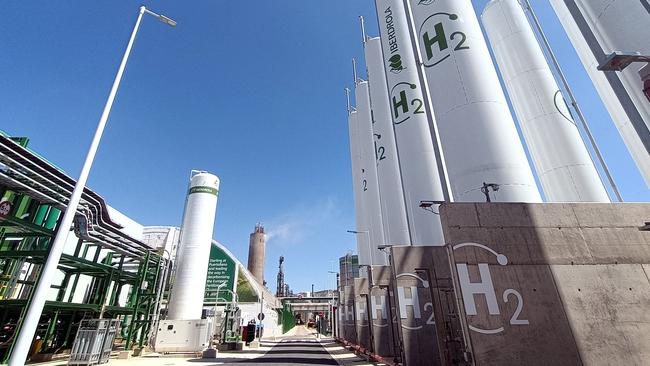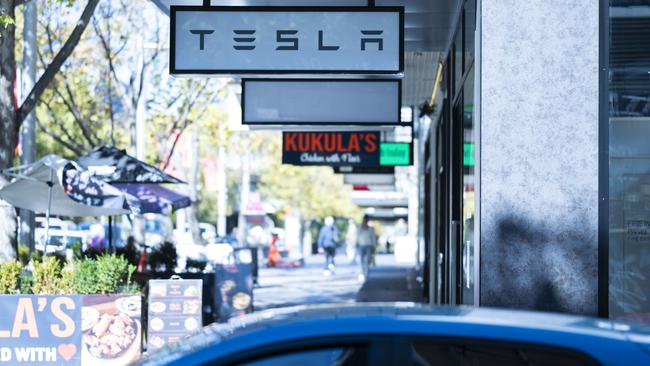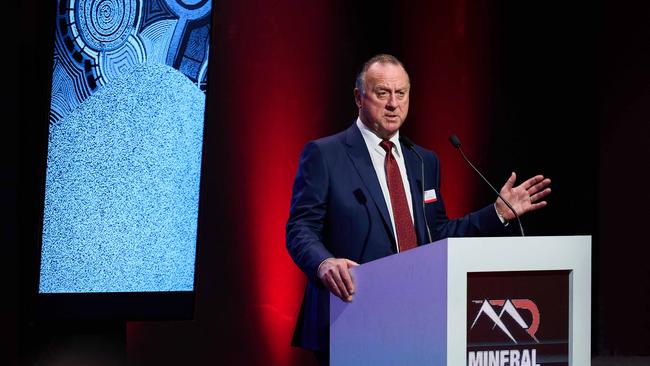Hydrogen, critical minerals projects wait on details of access to US Inflation Reduction Act
What will US President Joe Biden’s promise of access to the US Inflation Reduction Act mean for Australian resources projects?
A pipeline of Australian hydrogen and critical minerals projects worth more than $100bn stands to benefit from the federal government’s deal to give local companies access to the US Inflation Reduction Act.
The new Climate, Critical Minerals and Clean Energy Transformation Compact was announced by Prime Minister Anthony Albanese and US President Joe Biden on the sidelines of the G7 meeting in Japan over the weekend.
Mr Biden offered to give Australian resources companies “domestic supplier” status under the $US369bn ($555bn) Inflation Reduction Act.
Australian and US officials, including representatives of both countries export credit agencies, will spend the rest of 2023 negotiating the details of the compact.
Few details of the scope of the talks were revealed over the weekend.
At worst the outcome could be modest, with the only new benefit for Australian resources companies being access to a $US500m manufacturing fund – half of which is already committed by the Biden administration.
But the inclusion of Australian resources companies in the Inflation Reduction Act could also give local projects that wish to join the US supply chain access to more than $US40bn in cheap loan programs run by the US Department of Energy and other agencies, aimed at encouraging the construction of new energy and critical minerals manufacturing capability. But the real question is whether the US is prepared to give Australian producers access to other parts of the Inflation Reduction Act by extending some of the US production credits and subsidies to downstream refining and manufacturing in Australia.

The IRA is as much about reinvigorating the US manufacturing base as it is about carbon reduction. It includes a slew of tax credits for companies manufacturing hydrogen or refining a broad group of critical minerals, including lithium, nickel, rare earths and copper.
Over the past few years US car manufacturers such as Tesla, Ford and GM have struck deals with Australian lithium miners to secure supply of lithium concentrate. But none of that output is likely to be sent to the US for further refining.
Instead it will be bought by the suppliers of US carmakers and sent through a complex manufacturing chain – much of which is still reliant on China – before eventually going into an electric vehicle in the US. But as the US looks to try to strengthen its own supply chain and manufacturing base, more direct access to refined minerals from Australia would play into the rhetoric at the G7 meeting about making climate and clean energy a “central pillar” of the US-Australian alliance.
The IRA offers lucrative production credits for would-be hydrogen producers of up to $US3 a kilogram for domestic production – a significant factor in the likely capital flight to the US, according to Andrew Forrest’s Fortescue Future Industries.
Under the advanced manufacturing production credit, the US will offer similar production subsidies to companies refining lithium hydroxide, rare earth oxides, and manufacturers of components in the supply chain for solar cells, wind turbines and electric batteries.
According to a McKinsey analysis of the package last year, the IRA will offer about $US216bn of corporate tax credits over its 10-year life.
A guidance note issued by the Biden administration notes that the existing legislation already makes it possible for non-taxpayers to benefit from the production credits, as both the hydrogen scheme and the advanced manufacturing credits can be taken as direct cash payments – or be transferred to other companies in exchange for cash.
That could allow Australian producers to build refineries underpinned by US taxpayer subsidies, sell the tax credits on to US corporations, and help lock in critical minerals supplies for a rejuvenated US industrial heartland.

But while such a deal would sit within the spirit of the rhetoric of Mr Biden and Mr Albanese, the details of any deal will be subject to approval by the US congress. Giving non-US companies access to the IRA’s generous domestic subsidies could be a tough ask for lawmakers already involved in a pitched battle over raising the US debt ceiling.
The worst outcome for the Australian resources sector is that the promise to include Australia as a “domestic producer” under Title III of the Defense Production Act is limited to its precise definition within the IRA. According to a White House briefing note on the IRA, the only expansion of the Defense Production Act was the authorisation of an additional $US500m in funding to accelerate domestic production of solar cells, transformers and electric grid components, heat pumps, insulation, and hydrogen electrolysers, fuel cells and platinum group metals.
Almost $US250m of that has already been allocated to heat pump production projects, according to US budget documents, potentially leaving Australian projects out in the cold.
At stake is more than $100bn worth of Australian hydrogen and critical minerals projects currently sitting in the development pipeline, according to figures released in the Australian government’s annual Resources and Energy Major Projects report.
Figures in the report show that feasibility studies on potential hydrogen projects worth more than $90bn are already under way. More than $3.5bn worth of lithium refining projects are also under consideration by Australian miners, with more than $6.5bn worth of value-adding projects in rare earths and other critical minerals also under consideration.

Although details of the new deal still to be finalised, Australian resources companies welcomed the intent of the agreement on Monday.
Mineral Resources boss Chris Ellison, who this month criticised the Albanese government’s budget for doing little to help the Australian resources sector, said the announcement from President Biden and the Prime Minister was a welcome one.
“This agreement is a welcome step in helping to make the battery chemicals supply chain in Australia more cost competitive.
“MinRes has been calling for IRA incentives to be available for battery chemicals facilities built in Australia, and Prime Minister Albanese should be congratulated for this agreement and his commitment to add value to our resources.”
Iluka Resources has already won more than $1.2bn in loans from the Australian government for its Eneabba rare earth refinery, but managing director Tom O’Leary said the agreement offered an opportunity to “deepen collaboration between two allies and to seed the green technology industries that will be essential to our future prosperity”.
“We have a once in a generation opportunity to use that influence to pursue downstream industries and lift our sights beyond the mere extraction, and even the refining of minerals. Taking the further step to rare earth metallisation would represent a crucial gateway to the potential domestic manufacture of rare earth magnets in the future,” he said.




To join the conversation, please log in. Don't have an account? Register
Join the conversation, you are commenting as Logout